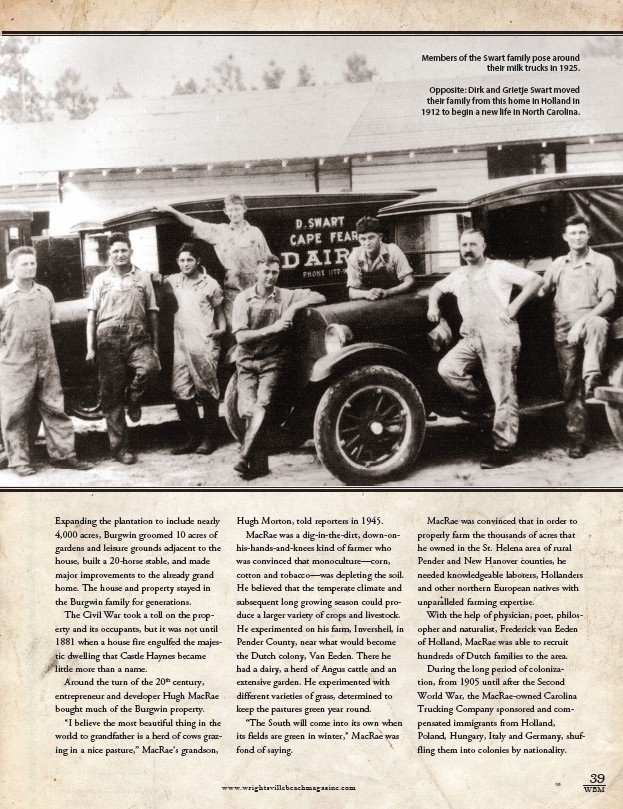
•
•
Expanding the plantation to include nearly
4,000 acres, Burgwin groomed 10 acres of
gardens and leisure grounds adjacent to the
house, built a 20-horse stable, and made
major improvements to the already grand
home. The house and property stayed in
the Burgwin family for generations.
The Civil War took a toll on the property
and its occupants, but it was not until
1881 when a house fire engulfed the majestic
dwelling that Castle Haynes became
little more than a name.
Around the turn of the 20th century,
entrepreneur and developer Hugh MacRae
bought much of the Burgwin property.
“I believe the most beautiful thing in the
world to grandfather is a herd of cows grazing
in a nice pasture,” MacRae’s grandson,
Hugh Morton, told reporters in 1945.
MacRae was a dig-in-the-dirt, down-onhis
hands-and-knees kind of farmer who
was convinced that monoculture—corn,
cotton and tobacco—was depleting the soil.
He believed that the temperate climate and
subsequent long growing season could produce
a larger variety of crops and livestock.
He experimented on his farm, Inversheil, in
Pender County, near what would become
the Dutch colony, Van Eeden. There he
had a dairy, a herd of Angus cattle and an
extensive garden. He experimented with
different varieties of grass, determined to
keep the pastures green year round.
“The South will come into its own when
its fields are green in winter,” MacRae was
fond of saying.
Members of the Swart family pose around
their milk trucks in 1925.
Opposite: Dirk and Grietje Swart moved
their family from this home in Holland in
1912 to begin a new life in North Carolina.
MacRae was convinced that in order to
properly farm the thousands of acres that
he owned in the St. Helena area of rural
Pender and New Hanover counties, he
needed knowledgeable laborers, Hollanders
and other northern European natives with
unparalleled farming expertise.
With the help of physician, poet, philosopher
and naturalist, Frederick van Eeden
of Holland, MacRae was able to recruit
hundreds of Dutch families to the area.
During the long period of colonization,
from 1905 until after the Second
World War, the MacRae-owned Carolina
Trucking Company sponsored and compensated
immigrants from Holland,
Poland, Hungary, Italy and Germany, shuffling
them into colonies by nationality.
39
www.wrightsvillebeachmagazine.com WBM